Analysing Organisational Behaviour: Culture, Politics, and Motivation
VerifiedAdded on 2020/11/12
|16
|4402
|211
Report
AI Summary
This report provides an in-depth analysis of organisational behaviour within 4Com Plc, a UK-based telecommunications company. It begins by examining how organisational culture, politics, and power dynamics influence individual and team behaviour and performance, utilizing Handy's culture typology to categorize and understand the company's culture. The report then delves into the application of content and process theories of motivation, such as Maslow's hierarchy, Alderfer's ERG theory, Herzberg's theory, Adam's equity theory, and Vroom's expectancy theory, to evaluate how these theories and motivational techniques enable effective achievement of goals within the organisational context. The report highlights the importance of skills, leadership, and attitude within the organisation to create a conducive work environment and achieve organisational objectives. The analysis provides insights into how 4Com Plc can improve its performance by understanding and managing these critical factors effectively.
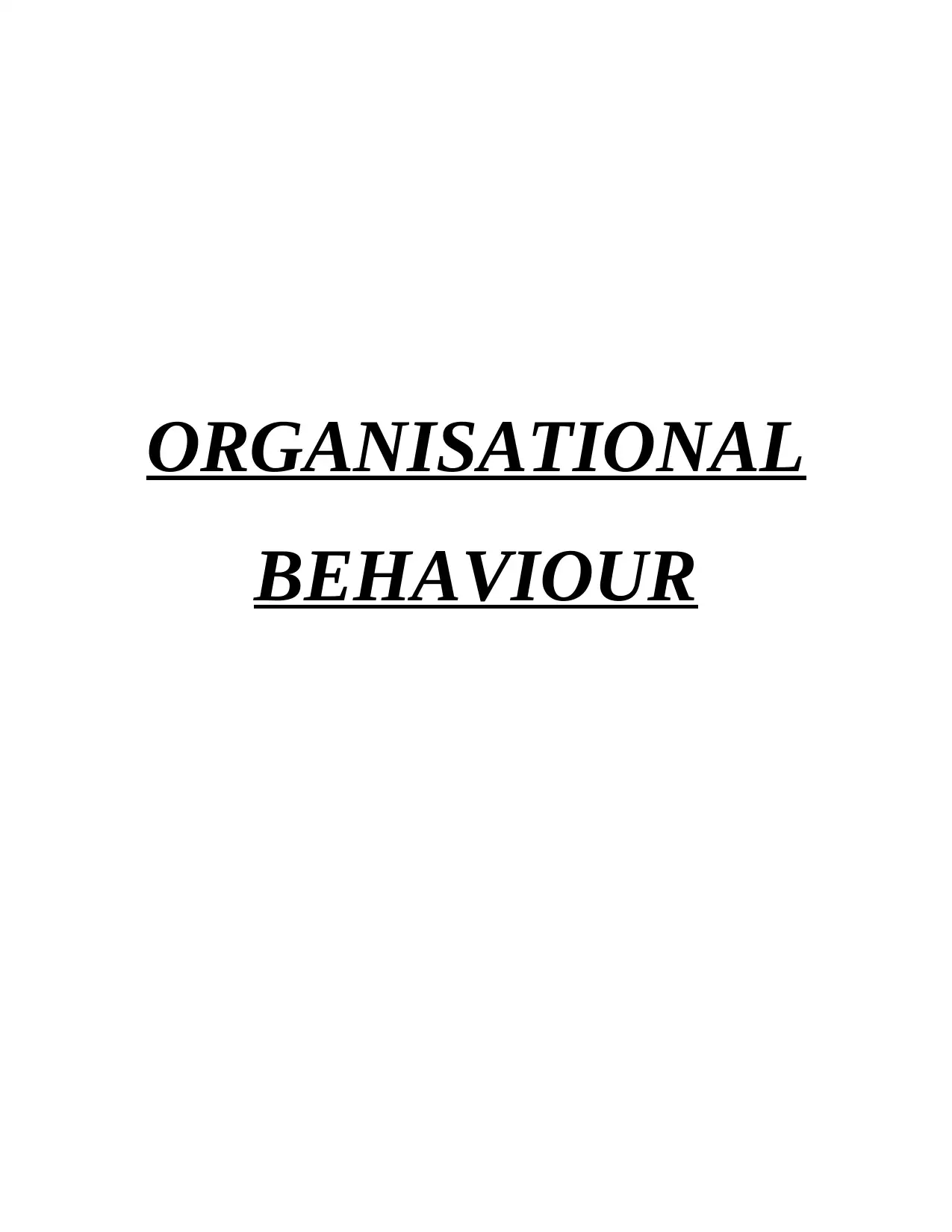
ORGANISATIONAL
BEHAVIOUR
BEHAVIOUR
Paraphrase This Document
Need a fresh take? Get an instant paraphrase of this document with our AI Paraphraser
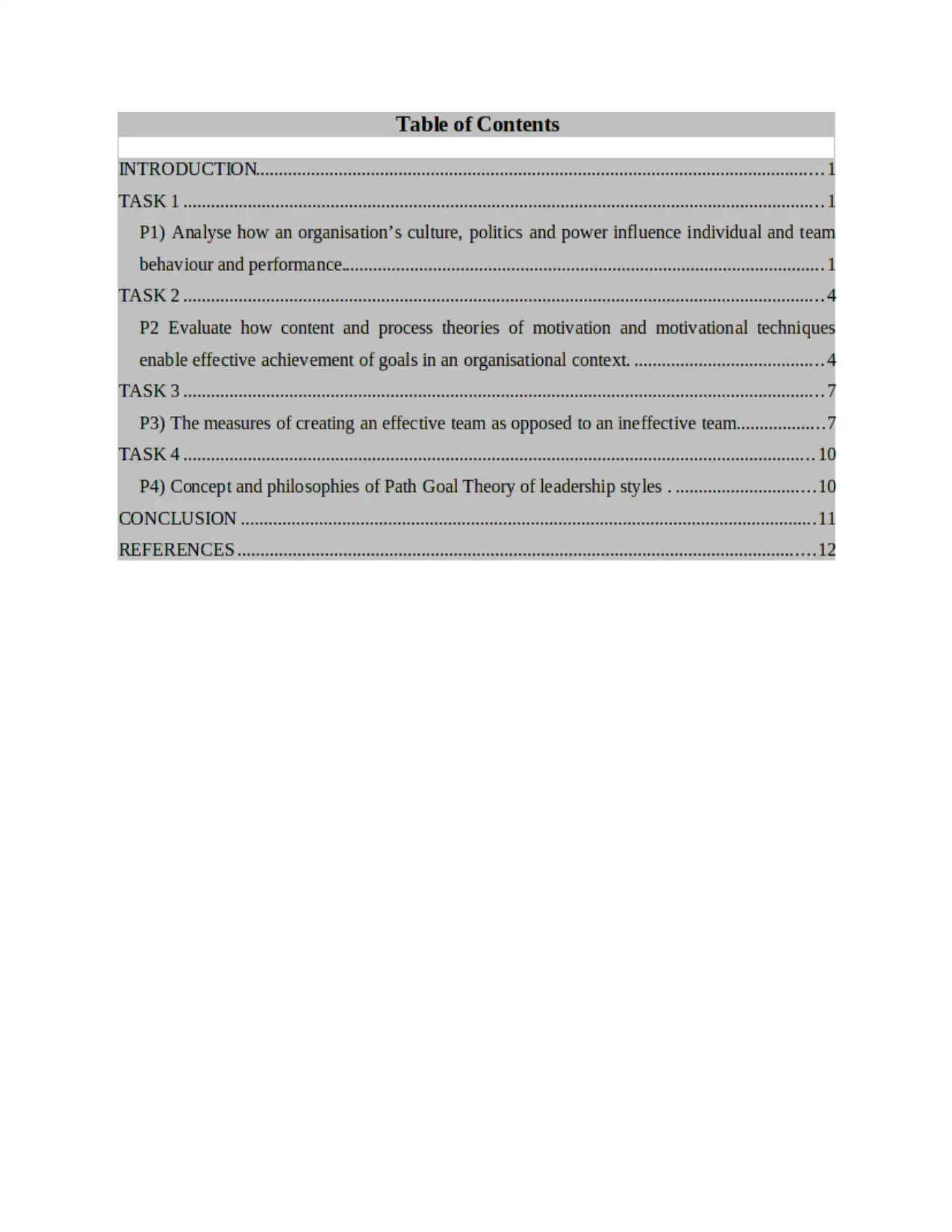
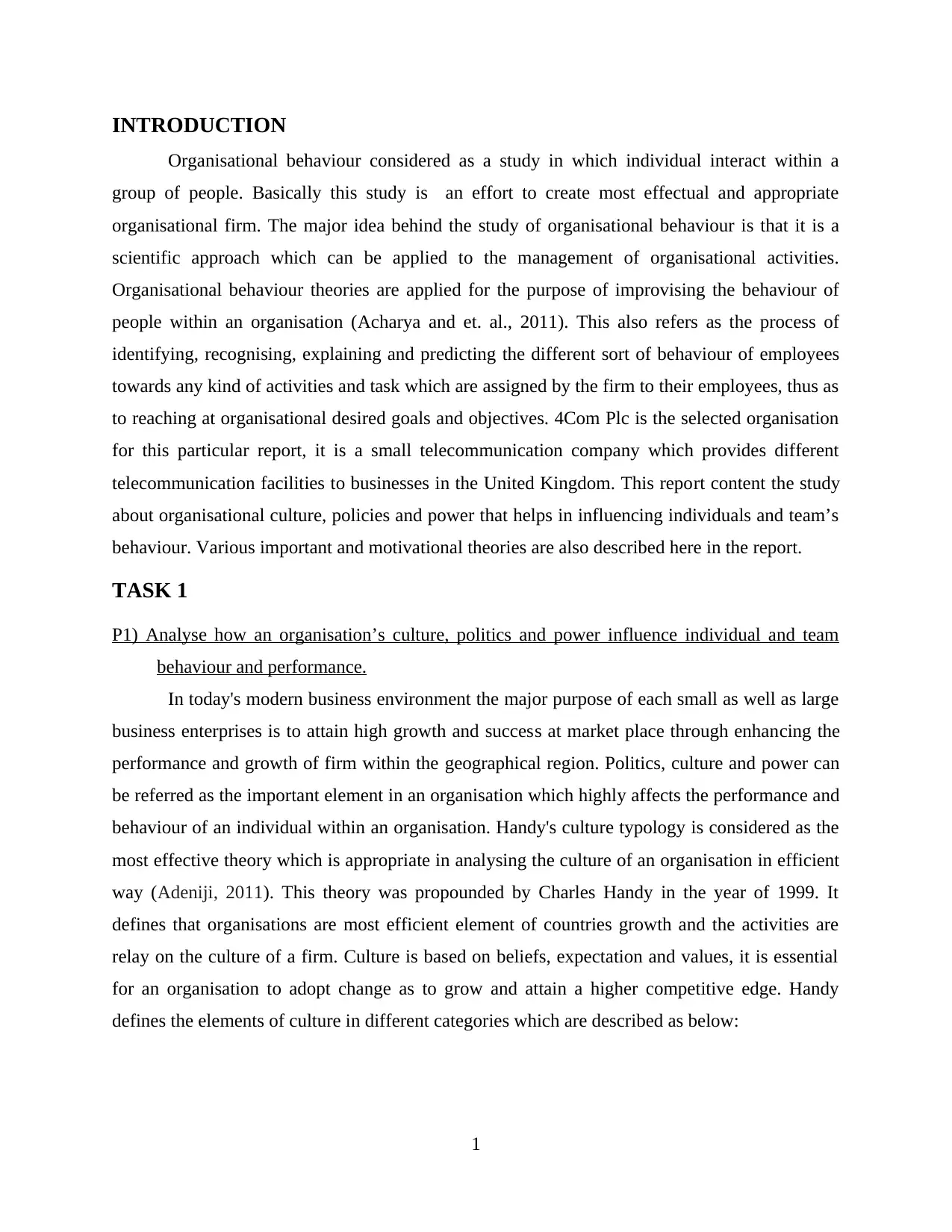
INTRODUCTION
Organisational behaviour considered as a study in which individual interact within a
group of people. Basically this study is an effort to create most effectual and appropriate
organisational firm. The major idea behind the study of organisational behaviour is that it is a
scientific approach which can be applied to the management of organisational activities.
Organisational behaviour theories are applied for the purpose of improvising the behaviour of
people within an organisation (Acharya and et. al., 2011). This also refers as the process of
identifying, recognising, explaining and predicting the different sort of behaviour of employees
towards any kind of activities and task which are assigned by the firm to their employees, thus as
to reaching at organisational desired goals and objectives. 4Com Plc is the selected organisation
for this particular report, it is a small telecommunication company which provides different
telecommunication facilities to businesses in the United Kingdom. This report content the study
about organisational culture, policies and power that helps in influencing individuals and team’s
behaviour. Various important and motivational theories are also described here in the report.
TASK 1
P1) Analyse how an organisation’s culture, politics and power influence individual and team
behaviour and performance.
In today's modern business environment the major purpose of each small as well as large
business enterprises is to attain high growth and success at market place through enhancing the
performance and growth of firm within the geographical region. Politics, culture and power can
be referred as the important element in an organisation which highly affects the performance and
behaviour of an individual within an organisation. Handy's culture typology is considered as the
most effective theory which is appropriate in analysing the culture of an organisation in efficient
way (Adeniji, 2011). This theory was propounded by Charles Handy in the year of 1999. It
defines that organisations are most efficient element of countries growth and the activities are
relay on the culture of a firm. Culture is based on beliefs, expectation and values, it is essential
for an organisation to adopt change as to grow and attain a higher competitive edge. Handy
defines the elements of culture in different categories which are described as below:
1
Organisational behaviour considered as a study in which individual interact within a
group of people. Basically this study is an effort to create most effectual and appropriate
organisational firm. The major idea behind the study of organisational behaviour is that it is a
scientific approach which can be applied to the management of organisational activities.
Organisational behaviour theories are applied for the purpose of improvising the behaviour of
people within an organisation (Acharya and et. al., 2011). This also refers as the process of
identifying, recognising, explaining and predicting the different sort of behaviour of employees
towards any kind of activities and task which are assigned by the firm to their employees, thus as
to reaching at organisational desired goals and objectives. 4Com Plc is the selected organisation
for this particular report, it is a small telecommunication company which provides different
telecommunication facilities to businesses in the United Kingdom. This report content the study
about organisational culture, policies and power that helps in influencing individuals and team’s
behaviour. Various important and motivational theories are also described here in the report.
TASK 1
P1) Analyse how an organisation’s culture, politics and power influence individual and team
behaviour and performance.
In today's modern business environment the major purpose of each small as well as large
business enterprises is to attain high growth and success at market place through enhancing the
performance and growth of firm within the geographical region. Politics, culture and power can
be referred as the important element in an organisation which highly affects the performance and
behaviour of an individual within an organisation. Handy's culture typology is considered as the
most effective theory which is appropriate in analysing the culture of an organisation in efficient
way (Adeniji, 2011). This theory was propounded by Charles Handy in the year of 1999. It
defines that organisations are most efficient element of countries growth and the activities are
relay on the culture of a firm. Culture is based on beliefs, expectation and values, it is essential
for an organisation to adopt change as to grow and attain a higher competitive edge. Handy
defines the elements of culture in different categories which are described as below:
1
⊘ This is a preview!⊘
Do you want full access?
Subscribe today to unlock all pages.

Trusted by 1+ million students worldwide
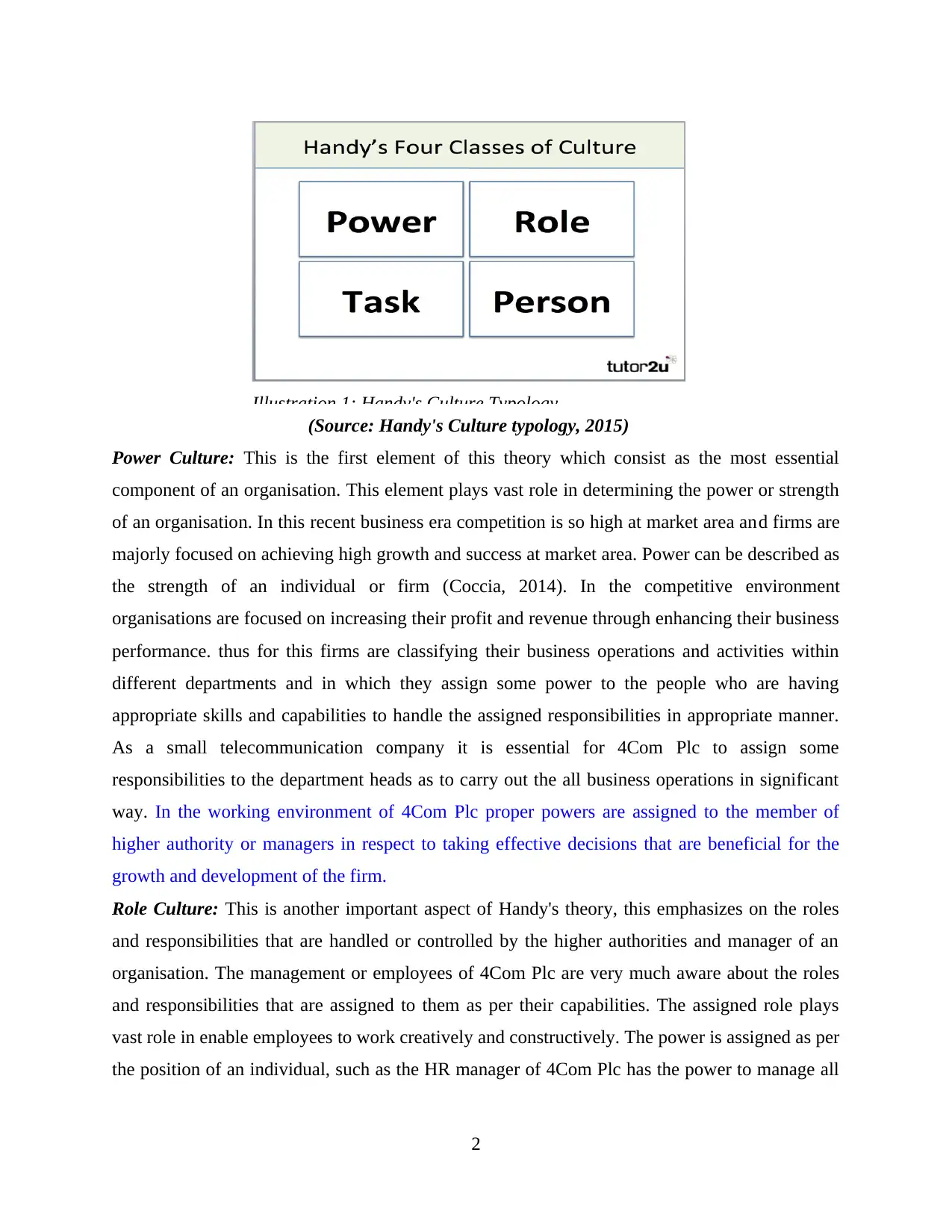
Illustration 1: Handy's Culture Typology
(Source: Handy's Culture typology, 2015)
Power Culture: This is the first element of this theory which consist as the most essential
component of an organisation. This element plays vast role in determining the power or strength
of an organisation. In this recent business era competition is so high at market area and firms are
majorly focused on achieving high growth and success at market area. Power can be described as
the strength of an individual or firm (Coccia, 2014). In the competitive environment
organisations are focused on increasing their profit and revenue through enhancing their business
performance. thus for this firms are classifying their business operations and activities within
different departments and in which they assign some power to the people who are having
appropriate skills and capabilities to handle the assigned responsibilities in appropriate manner.
As a small telecommunication company it is essential for 4Com Plc to assign some
responsibilities to the department heads as to carry out the all business operations in significant
way. In the working environment of 4Com Plc proper powers are assigned to the member of
higher authority or managers in respect to taking effective decisions that are beneficial for the
growth and development of the firm.
Role Culture: This is another important aspect of Handy's theory, this emphasizes on the roles
and responsibilities that are handled or controlled by the higher authorities and manager of an
organisation. The management or employees of 4Com Plc are very much aware about the roles
and responsibilities that are assigned to them as per their capabilities. The assigned role plays
vast role in enable employees to work creatively and constructively. The power is assigned as per
the position of an individual, such as the HR manager of 4Com Plc has the power to manage all
2
(Source: Handy's Culture typology, 2015)
Power Culture: This is the first element of this theory which consist as the most essential
component of an organisation. This element plays vast role in determining the power or strength
of an organisation. In this recent business era competition is so high at market area and firms are
majorly focused on achieving high growth and success at market area. Power can be described as
the strength of an individual or firm (Coccia, 2014). In the competitive environment
organisations are focused on increasing their profit and revenue through enhancing their business
performance. thus for this firms are classifying their business operations and activities within
different departments and in which they assign some power to the people who are having
appropriate skills and capabilities to handle the assigned responsibilities in appropriate manner.
As a small telecommunication company it is essential for 4Com Plc to assign some
responsibilities to the department heads as to carry out the all business operations in significant
way. In the working environment of 4Com Plc proper powers are assigned to the member of
higher authority or managers in respect to taking effective decisions that are beneficial for the
growth and development of the firm.
Role Culture: This is another important aspect of Handy's theory, this emphasizes on the roles
and responsibilities that are handled or controlled by the higher authorities and manager of an
organisation. The management or employees of 4Com Plc are very much aware about the roles
and responsibilities that are assigned to them as per their capabilities. The assigned role plays
vast role in enable employees to work creatively and constructively. The power is assigned as per
the position of an individual, such as the HR manager of 4Com Plc has the power to manage all
2
Paraphrase This Document
Need a fresh take? Get an instant paraphrase of this document with our AI Paraphraser
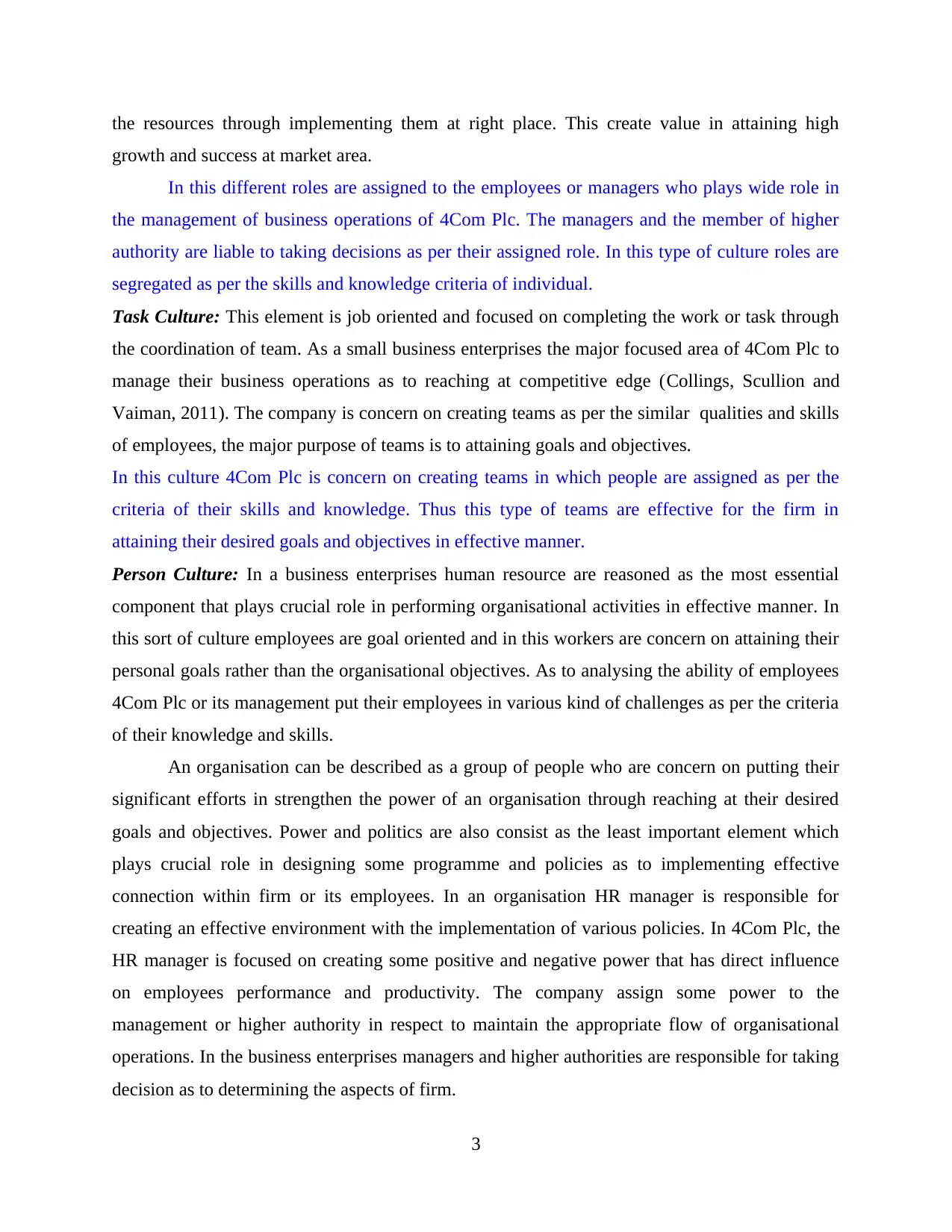
the resources through implementing them at right place. This create value in attaining high
growth and success at market area.
In this different roles are assigned to the employees or managers who plays wide role in
the management of business operations of 4Com Plc. The managers and the member of higher
authority are liable to taking decisions as per their assigned role. In this type of culture roles are
segregated as per the skills and knowledge criteria of individual.
Task Culture: This element is job oriented and focused on completing the work or task through
the coordination of team. As a small business enterprises the major focused area of 4Com Plc to
manage their business operations as to reaching at competitive edge (Collings, Scullion and
Vaiman, 2011). The company is concern on creating teams as per the similar qualities and skills
of employees, the major purpose of teams is to attaining goals and objectives.
In this culture 4Com Plc is concern on creating teams in which people are assigned as per the
criteria of their skills and knowledge. Thus this type of teams are effective for the firm in
attaining their desired goals and objectives in effective manner.
Person Culture: In a business enterprises human resource are reasoned as the most essential
component that plays crucial role in performing organisational activities in effective manner. In
this sort of culture employees are goal oriented and in this workers are concern on attaining their
personal goals rather than the organisational objectives. As to analysing the ability of employees
4Com Plc or its management put their employees in various kind of challenges as per the criteria
of their knowledge and skills.
An organisation can be described as a group of people who are concern on putting their
significant efforts in strengthen the power of an organisation through reaching at their desired
goals and objectives. Power and politics are also consist as the least important element which
plays crucial role in designing some programme and policies as to implementing effective
connection within firm or its employees. In an organisation HR manager is responsible for
creating an effective environment with the implementation of various policies. In 4Com Plc, the
HR manager is focused on creating some positive and negative power that has direct influence
on employees performance and productivity. The company assign some power to the
management or higher authority in respect to maintain the appropriate flow of organisational
operations. In the business enterprises managers and higher authorities are responsible for taking
decision as to determining the aspects of firm.
3
growth and success at market area.
In this different roles are assigned to the employees or managers who plays wide role in
the management of business operations of 4Com Plc. The managers and the member of higher
authority are liable to taking decisions as per their assigned role. In this type of culture roles are
segregated as per the skills and knowledge criteria of individual.
Task Culture: This element is job oriented and focused on completing the work or task through
the coordination of team. As a small business enterprises the major focused area of 4Com Plc to
manage their business operations as to reaching at competitive edge (Collings, Scullion and
Vaiman, 2011). The company is concern on creating teams as per the similar qualities and skills
of employees, the major purpose of teams is to attaining goals and objectives.
In this culture 4Com Plc is concern on creating teams in which people are assigned as per the
criteria of their skills and knowledge. Thus this type of teams are effective for the firm in
attaining their desired goals and objectives in effective manner.
Person Culture: In a business enterprises human resource are reasoned as the most essential
component that plays crucial role in performing organisational activities in effective manner. In
this sort of culture employees are goal oriented and in this workers are concern on attaining their
personal goals rather than the organisational objectives. As to analysing the ability of employees
4Com Plc or its management put their employees in various kind of challenges as per the criteria
of their knowledge and skills.
An organisation can be described as a group of people who are concern on putting their
significant efforts in strengthen the power of an organisation through reaching at their desired
goals and objectives. Power and politics are also consist as the least important element which
plays crucial role in designing some programme and policies as to implementing effective
connection within firm or its employees. In an organisation HR manager is responsible for
creating an effective environment with the implementation of various policies. In 4Com Plc, the
HR manager is focused on creating some positive and negative power that has direct influence
on employees performance and productivity. The company assign some power to the
management or higher authority in respect to maintain the appropriate flow of organisational
operations. In the business enterprises managers and higher authorities are responsible for taking
decision as to determining the aspects of firm.
3
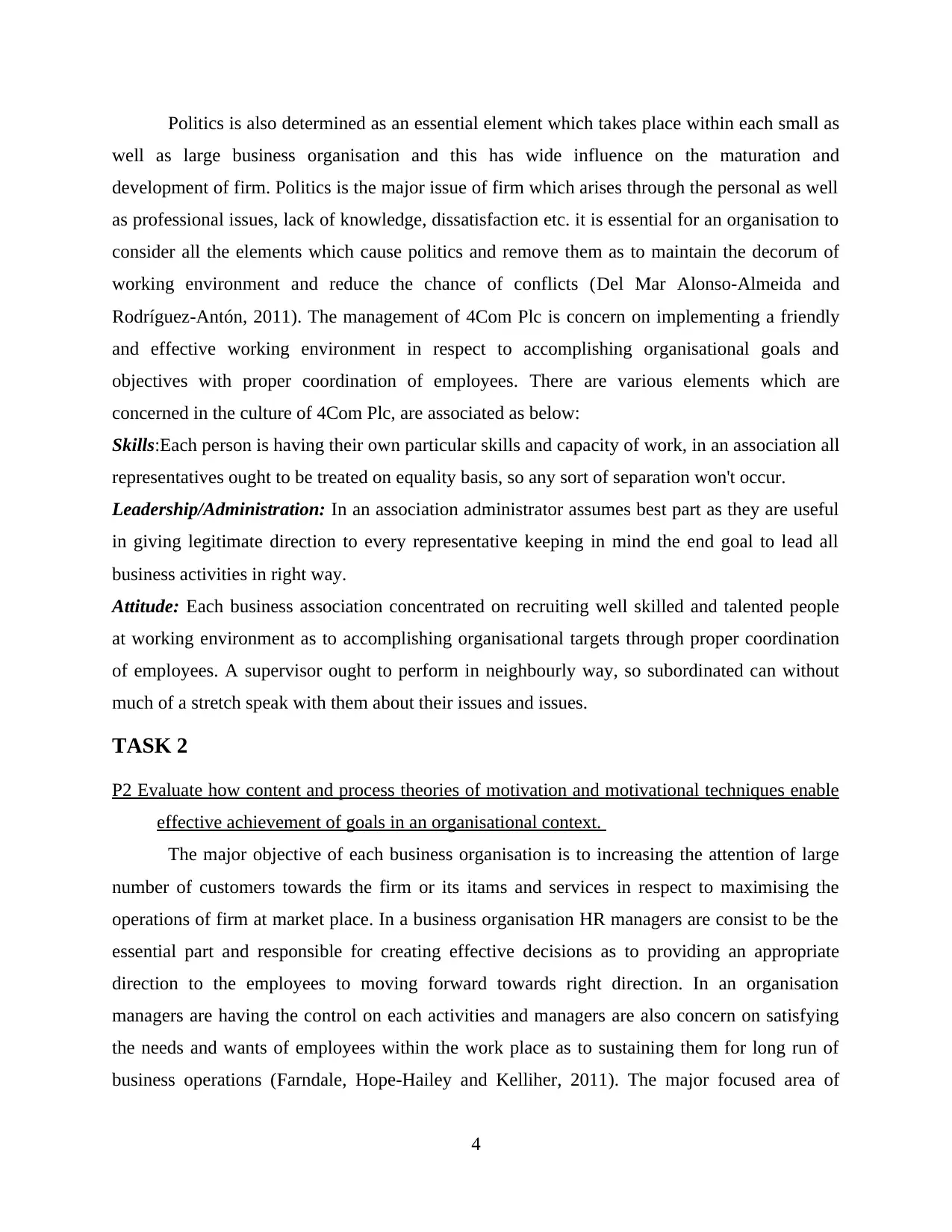
Politics is also determined as an essential element which takes place within each small as
well as large business organisation and this has wide influence on the maturation and
development of firm. Politics is the major issue of firm which arises through the personal as well
as professional issues, lack of knowledge, dissatisfaction etc. it is essential for an organisation to
consider all the elements which cause politics and remove them as to maintain the decorum of
working environment and reduce the chance of conflicts (Del Mar Alonso-Almeida and
Rodríguez-Antón, 2011). The management of 4Com Plc is concern on implementing a friendly
and effective working environment in respect to accomplishing organisational goals and
objectives with proper coordination of employees. There are various elements which are
concerned in the culture of 4Com Plc, are associated as below:
Skills:Each person is having their own particular skills and capacity of work, in an association all
representatives ought to be treated on equality basis, so any sort of separation won't occur.
Leadership/Administration: In an association administrator assumes best part as they are useful
in giving legitimate direction to every representative keeping in mind the end goal to lead all
business activities in right way.
Attitude: Each business association concentrated on recruiting well skilled and talented people
at working environment as to accomplishing organisational targets through proper coordination
of employees. A supervisor ought to perform in neighbourly way, so subordinated can without
much of a stretch speak with them about their issues and issues.
TASK 2
P2 Evaluate how content and process theories of motivation and motivational techniques enable
effective achievement of goals in an organisational context.
The major objective of each business organisation is to increasing the attention of large
number of customers towards the firm or its itams and services in respect to maximising the
operations of firm at market place. In a business organisation HR managers are consist to be the
essential part and responsible for creating effective decisions as to providing an appropriate
direction to the employees to moving forward towards right direction. In an organisation
managers are having the control on each activities and managers are also concern on satisfying
the needs and wants of employees within the work place as to sustaining them for long run of
business operations (Farndale, Hope-Hailey and Kelliher, 2011). The major focused area of
4
well as large business organisation and this has wide influence on the maturation and
development of firm. Politics is the major issue of firm which arises through the personal as well
as professional issues, lack of knowledge, dissatisfaction etc. it is essential for an organisation to
consider all the elements which cause politics and remove them as to maintain the decorum of
working environment and reduce the chance of conflicts (Del Mar Alonso-Almeida and
Rodríguez-Antón, 2011). The management of 4Com Plc is concern on implementing a friendly
and effective working environment in respect to accomplishing organisational goals and
objectives with proper coordination of employees. There are various elements which are
concerned in the culture of 4Com Plc, are associated as below:
Skills:Each person is having their own particular skills and capacity of work, in an association all
representatives ought to be treated on equality basis, so any sort of separation won't occur.
Leadership/Administration: In an association administrator assumes best part as they are useful
in giving legitimate direction to every representative keeping in mind the end goal to lead all
business activities in right way.
Attitude: Each business association concentrated on recruiting well skilled and talented people
at working environment as to accomplishing organisational targets through proper coordination
of employees. A supervisor ought to perform in neighbourly way, so subordinated can without
much of a stretch speak with them about their issues and issues.
TASK 2
P2 Evaluate how content and process theories of motivation and motivational techniques enable
effective achievement of goals in an organisational context.
The major objective of each business organisation is to increasing the attention of large
number of customers towards the firm or its itams and services in respect to maximising the
operations of firm at market place. In a business organisation HR managers are consist to be the
essential part and responsible for creating effective decisions as to providing an appropriate
direction to the employees to moving forward towards right direction. In an organisation
managers are having the control on each activities and managers are also concern on satisfying
the needs and wants of employees within the work place as to sustaining them for long run of
business operations (Farndale, Hope-Hailey and Kelliher, 2011). The major focused area of
4
⊘ This is a preview!⊘
Do you want full access?
Subscribe today to unlock all pages.

Trusted by 1+ million students worldwide
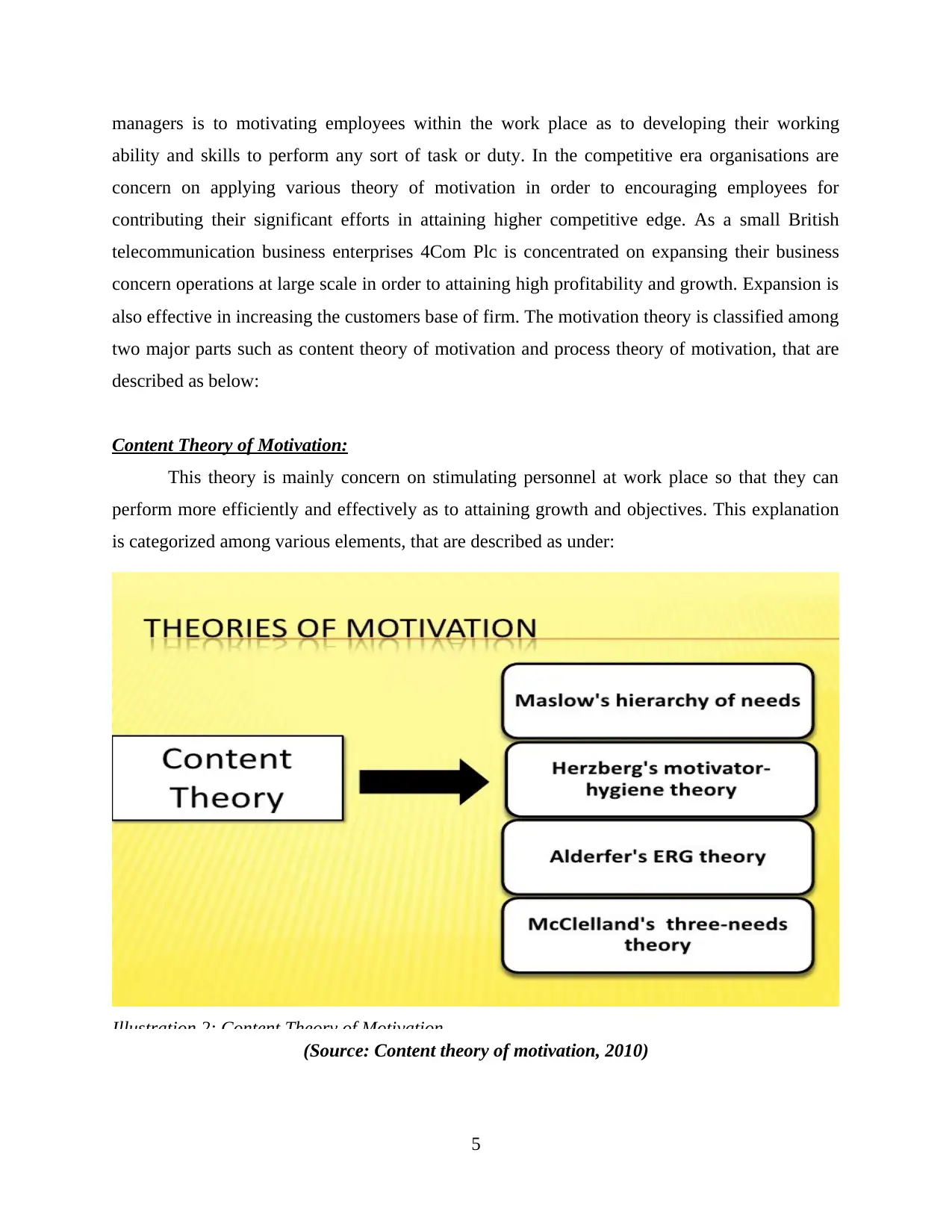
managers is to motivating employees within the work place as to developing their working
ability and skills to perform any sort of task or duty. In the competitive era organisations are
concern on applying various theory of motivation in order to encouraging employees for
contributing their significant efforts in attaining higher competitive edge. As a small British
telecommunication business enterprises 4Com Plc is concentrated on expansing their business
concern operations at large scale in order to attaining high profitability and growth. Expansion is
also effective in increasing the customers base of firm. The motivation theory is classified among
two major parts such as content theory of motivation and process theory of motivation, that are
described as below:
Content Theory of Motivation:
This theory is mainly concern on stimulating personnel at work place so that they can
perform more efficiently and effectively as to attaining growth and objectives. This explanation
is categorized among various elements, that are described as under:
Illustration 2: Content Theory of Motivation
(Source: Content theory of motivation, 2010)
5
ability and skills to perform any sort of task or duty. In the competitive era organisations are
concern on applying various theory of motivation in order to encouraging employees for
contributing their significant efforts in attaining higher competitive edge. As a small British
telecommunication business enterprises 4Com Plc is concentrated on expansing their business
concern operations at large scale in order to attaining high profitability and growth. Expansion is
also effective in increasing the customers base of firm. The motivation theory is classified among
two major parts such as content theory of motivation and process theory of motivation, that are
described as below:
Content Theory of Motivation:
This theory is mainly concern on stimulating personnel at work place so that they can
perform more efficiently and effectively as to attaining growth and objectives. This explanation
is categorized among various elements, that are described as under:
Illustration 2: Content Theory of Motivation
(Source: Content theory of motivation, 2010)
5
Paraphrase This Document
Need a fresh take? Get an instant paraphrase of this document with our AI Paraphraser
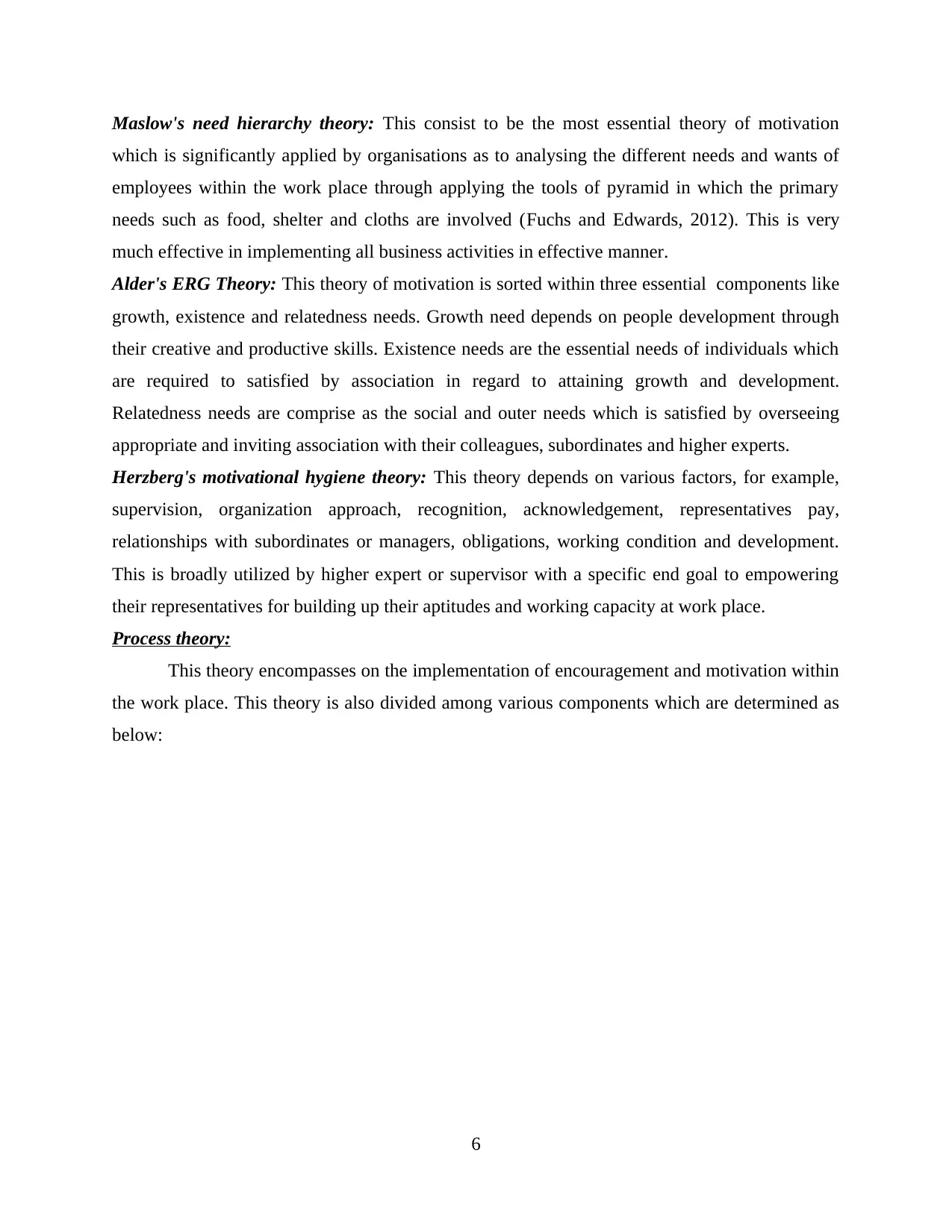
Maslow's need hierarchy theory: This consist to be the most essential theory of motivation
which is significantly applied by organisations as to analysing the different needs and wants of
employees within the work place through applying the tools of pyramid in which the primary
needs such as food, shelter and cloths are involved (Fuchs and Edwards, 2012). This is very
much effective in implementing all business activities in effective manner.
Alder's ERG Theory: This theory of motivation is sorted within three essential components like
growth, existence and relatedness needs. Growth need depends on people development through
their creative and productive skills. Existence needs are the essential needs of individuals which
are required to satisfied by association in regard to attaining growth and development.
Relatedness needs are comprise as the social and outer needs which is satisfied by overseeing
appropriate and inviting association with their colleagues, subordinates and higher experts.
Herzberg's motivational hygiene theory: This theory depends on various factors, for example,
supervision, organization approach, recognition, acknowledgement, representatives pay,
relationships with subordinates or managers, obligations, working condition and development.
This is broadly utilized by higher expert or supervisor with a specific end goal to empowering
their representatives for building up their aptitudes and working capacity at work place.
Process theory:
This theory encompasses on the implementation of encouragement and motivation within
the work place. This theory is also divided among various components which are determined as
below:
6
which is significantly applied by organisations as to analysing the different needs and wants of
employees within the work place through applying the tools of pyramid in which the primary
needs such as food, shelter and cloths are involved (Fuchs and Edwards, 2012). This is very
much effective in implementing all business activities in effective manner.
Alder's ERG Theory: This theory of motivation is sorted within three essential components like
growth, existence and relatedness needs. Growth need depends on people development through
their creative and productive skills. Existence needs are the essential needs of individuals which
are required to satisfied by association in regard to attaining growth and development.
Relatedness needs are comprise as the social and outer needs which is satisfied by overseeing
appropriate and inviting association with their colleagues, subordinates and higher experts.
Herzberg's motivational hygiene theory: This theory depends on various factors, for example,
supervision, organization approach, recognition, acknowledgement, representatives pay,
relationships with subordinates or managers, obligations, working condition and development.
This is broadly utilized by higher expert or supervisor with a specific end goal to empowering
their representatives for building up their aptitudes and working capacity at work place.
Process theory:
This theory encompasses on the implementation of encouragement and motivation within
the work place. This theory is also divided among various components which are determined as
below:
6
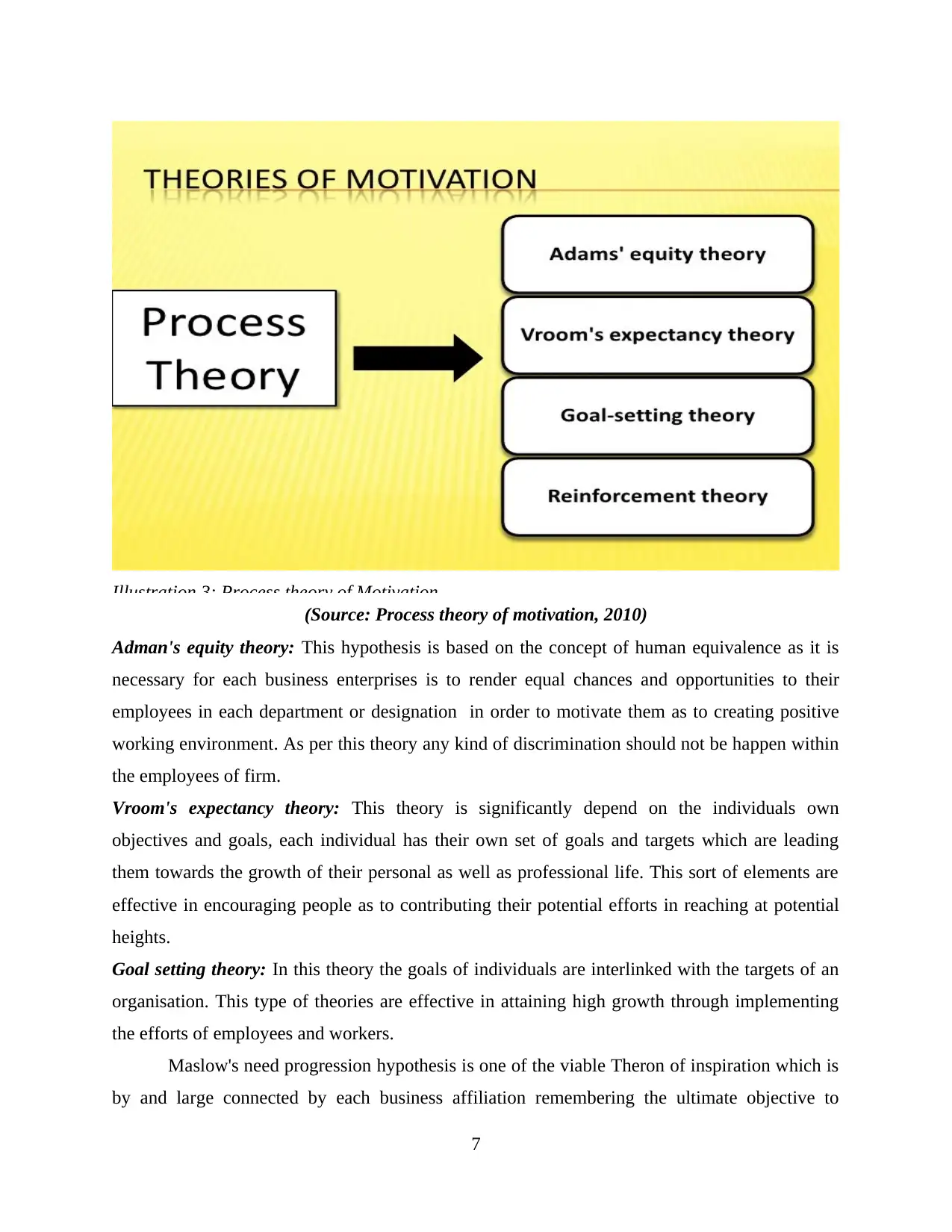
Illustration 3: Process theory of Motivation
(Source: Process theory of motivation, 2010)
Adman's equity theory: This hypothesis is based on the concept of human equivalence as it is
necessary for each business enterprises is to render equal chances and opportunities to their
employees in each department or designation in order to motivate them as to creating positive
working environment. As per this theory any kind of discrimination should not be happen within
the employees of firm.
Vroom's expectancy theory: This theory is significantly depend on the individuals own
objectives and goals, each individual has their own set of goals and targets which are leading
them towards the growth of their personal as well as professional life. This sort of elements are
effective in encouraging people as to contributing their potential efforts in reaching at potential
heights.
Goal setting theory: In this theory the goals of individuals are interlinked with the targets of an
organisation. This type of theories are effective in attaining high growth through implementing
the efforts of employees and workers.
Maslow's need progression hypothesis is one of the viable Theron of inspiration which is
by and large connected by each business affiliation remembering the ultimate objective to
7
(Source: Process theory of motivation, 2010)
Adman's equity theory: This hypothesis is based on the concept of human equivalence as it is
necessary for each business enterprises is to render equal chances and opportunities to their
employees in each department or designation in order to motivate them as to creating positive
working environment. As per this theory any kind of discrimination should not be happen within
the employees of firm.
Vroom's expectancy theory: This theory is significantly depend on the individuals own
objectives and goals, each individual has their own set of goals and targets which are leading
them towards the growth of their personal as well as professional life. This sort of elements are
effective in encouraging people as to contributing their potential efforts in reaching at potential
heights.
Goal setting theory: In this theory the goals of individuals are interlinked with the targets of an
organisation. This type of theories are effective in attaining high growth through implementing
the efforts of employees and workers.
Maslow's need progression hypothesis is one of the viable Theron of inspiration which is
by and large connected by each business affiliation remembering the ultimate objective to
7
⊘ This is a preview!⊘
Do you want full access?
Subscribe today to unlock all pages.

Trusted by 1+ million students worldwide
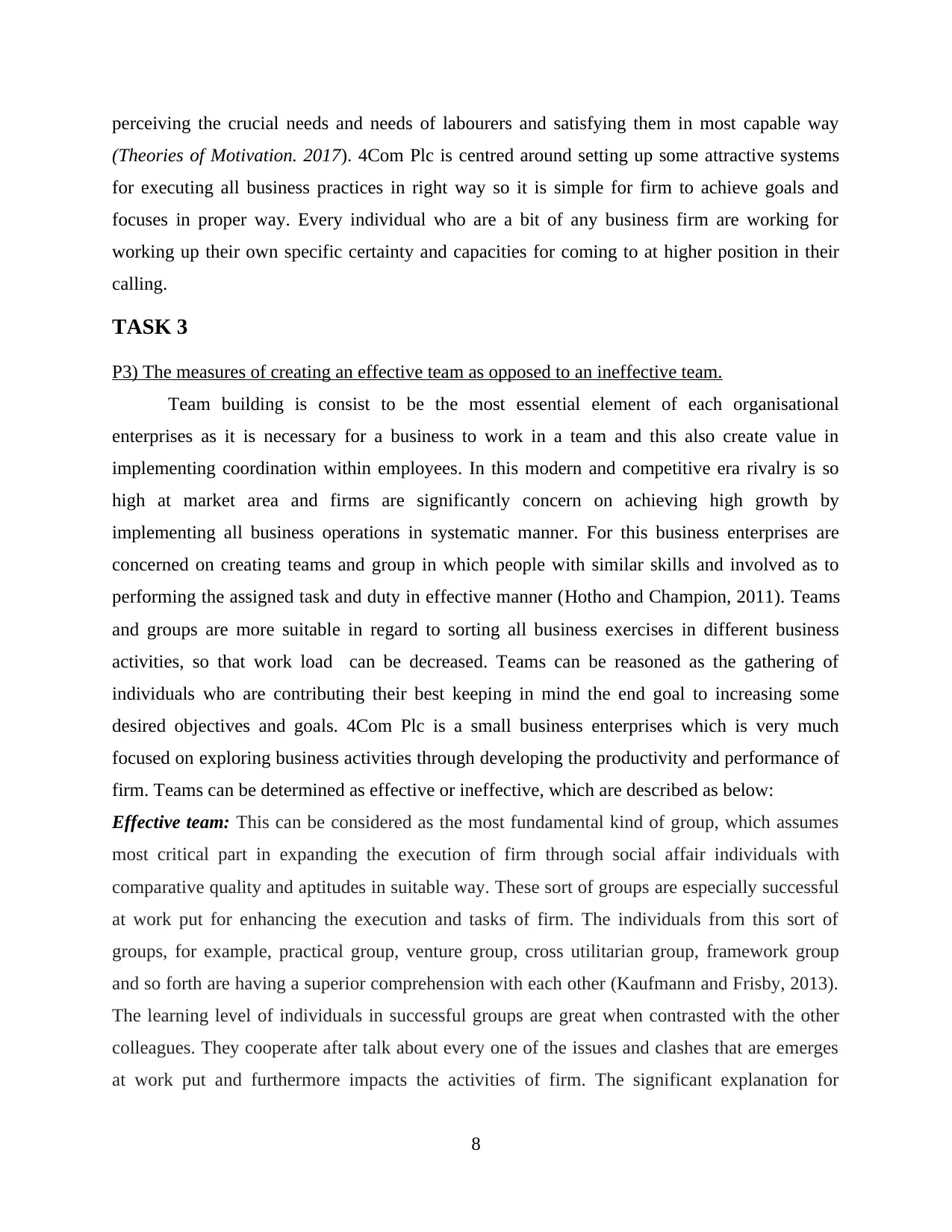
perceiving the crucial needs and needs of labourers and satisfying them in most capable way
(Theories of Motivation. 2017). 4Com Plc is centred around setting up some attractive systems
for executing all business practices in right way so it is simple for firm to achieve goals and
focuses in proper way. Every individual who are a bit of any business firm are working for
working up their own specific certainty and capacities for coming to at higher position in their
calling.
TASK 3
P3) The measures of creating an effective team as opposed to an ineffective team.
Team building is consist to be the most essential element of each organisational
enterprises as it is necessary for a business to work in a team and this also create value in
implementing coordination within employees. In this modern and competitive era rivalry is so
high at market area and firms are significantly concern on achieving high growth by
implementing all business operations in systematic manner. For this business enterprises are
concerned on creating teams and group in which people with similar skills and involved as to
performing the assigned task and duty in effective manner (Hotho and Champion, 2011). Teams
and groups are more suitable in regard to sorting all business exercises in different business
activities, so that work load can be decreased. Teams can be reasoned as the gathering of
individuals who are contributing their best keeping in mind the end goal to increasing some
desired objectives and goals. 4Com Plc is a small business enterprises which is very much
focused on exploring business activities through developing the productivity and performance of
firm. Teams can be determined as effective or ineffective, which are described as below:
Effective team: This can be considered as the most fundamental kind of group, which assumes
most critical part in expanding the execution of firm through social affair individuals with
comparative quality and aptitudes in suitable way. These sort of groups are especially successful
at work put for enhancing the execution and tasks of firm. The individuals from this sort of
groups, for example, practical group, venture group, cross utilitarian group, framework group
and so forth are having a superior comprehension with each other (Kaufmann and Frisby, 2013).
The learning level of individuals in successful groups are great when contrasted with the other
colleagues. They cooperate after talk about every one of the issues and clashes that are emerges
at work put and furthermore impacts the activities of firm. The significant explanation for
8
(Theories of Motivation. 2017). 4Com Plc is centred around setting up some attractive systems
for executing all business practices in right way so it is simple for firm to achieve goals and
focuses in proper way. Every individual who are a bit of any business firm are working for
working up their own specific certainty and capacities for coming to at higher position in their
calling.
TASK 3
P3) The measures of creating an effective team as opposed to an ineffective team.
Team building is consist to be the most essential element of each organisational
enterprises as it is necessary for a business to work in a team and this also create value in
implementing coordination within employees. In this modern and competitive era rivalry is so
high at market area and firms are significantly concern on achieving high growth by
implementing all business operations in systematic manner. For this business enterprises are
concerned on creating teams and group in which people with similar skills and involved as to
performing the assigned task and duty in effective manner (Hotho and Champion, 2011). Teams
and groups are more suitable in regard to sorting all business exercises in different business
activities, so that work load can be decreased. Teams can be reasoned as the gathering of
individuals who are contributing their best keeping in mind the end goal to increasing some
desired objectives and goals. 4Com Plc is a small business enterprises which is very much
focused on exploring business activities through developing the productivity and performance of
firm. Teams can be determined as effective or ineffective, which are described as below:
Effective team: This can be considered as the most fundamental kind of group, which assumes
most critical part in expanding the execution of firm through social affair individuals with
comparative quality and aptitudes in suitable way. These sort of groups are especially successful
at work put for enhancing the execution and tasks of firm. The individuals from this sort of
groups, for example, practical group, venture group, cross utilitarian group, framework group
and so forth are having a superior comprehension with each other (Kaufmann and Frisby, 2013).
The learning level of individuals in successful groups are great when contrasted with the other
colleagues. They cooperate after talk about every one of the issues and clashes that are emerges
at work put and furthermore impacts the activities of firm. The significant explanation for
8
Paraphrase This Document
Need a fresh take? Get an instant paraphrase of this document with our AI Paraphraser
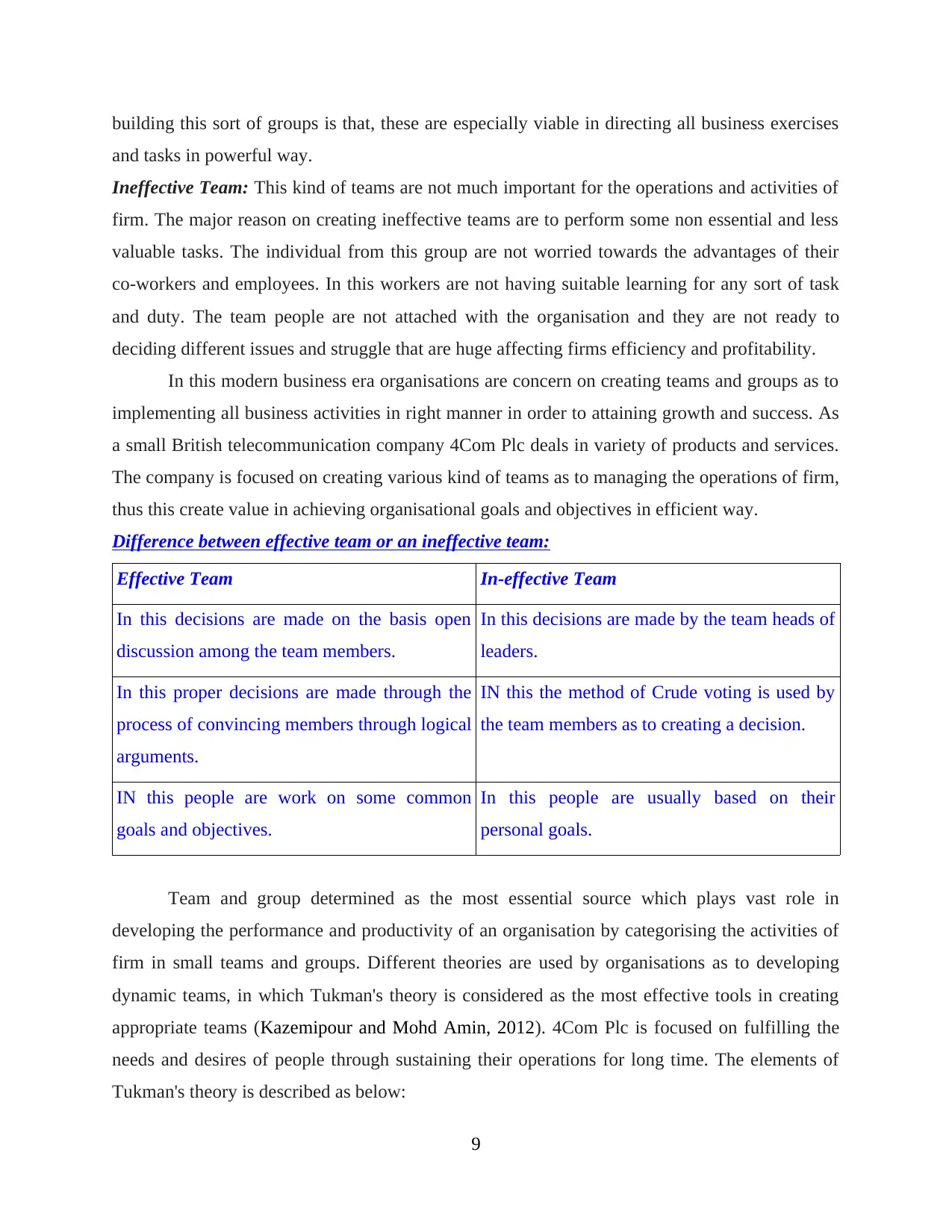
building this sort of groups is that, these are especially viable in directing all business exercises
and tasks in powerful way.
Ineffective Team: This kind of teams are not much important for the operations and activities of
firm. The major reason on creating ineffective teams are to perform some non essential and less
valuable tasks. The individual from this group are not worried towards the advantages of their
co-workers and employees. In this workers are not having suitable learning for any sort of task
and duty. The team people are not attached with the organisation and they are not ready to
deciding different issues and struggle that are huge affecting firms efficiency and profitability.
In this modern business era organisations are concern on creating teams and groups as to
implementing all business activities in right manner in order to attaining growth and success. As
a small British telecommunication company 4Com Plc deals in variety of products and services.
The company is focused on creating various kind of teams as to managing the operations of firm,
thus this create value in achieving organisational goals and objectives in efficient way.
Difference between effective team or an ineffective team:
Effective Team In-effective Team
In this decisions are made on the basis open
discussion among the team members.
In this decisions are made by the team heads of
leaders.
In this proper decisions are made through the
process of convincing members through logical
arguments.
IN this the method of Crude voting is used by
the team members as to creating a decision.
IN this people are work on some common
goals and objectives.
In this people are usually based on their
personal goals.
Team and group determined as the most essential source which plays vast role in
developing the performance and productivity of an organisation by categorising the activities of
firm in small teams and groups. Different theories are used by organisations as to developing
dynamic teams, in which Tukman's theory is considered as the most effective tools in creating
appropriate teams (Kazemipour and Mohd Amin, 2012). 4Com Plc is focused on fulfilling the
needs and desires of people through sustaining their operations for long time. The elements of
Tukman's theory is described as below:
9
and tasks in powerful way.
Ineffective Team: This kind of teams are not much important for the operations and activities of
firm. The major reason on creating ineffective teams are to perform some non essential and less
valuable tasks. The individual from this group are not worried towards the advantages of their
co-workers and employees. In this workers are not having suitable learning for any sort of task
and duty. The team people are not attached with the organisation and they are not ready to
deciding different issues and struggle that are huge affecting firms efficiency and profitability.
In this modern business era organisations are concern on creating teams and groups as to
implementing all business activities in right manner in order to attaining growth and success. As
a small British telecommunication company 4Com Plc deals in variety of products and services.
The company is focused on creating various kind of teams as to managing the operations of firm,
thus this create value in achieving organisational goals and objectives in efficient way.
Difference between effective team or an ineffective team:
Effective Team In-effective Team
In this decisions are made on the basis open
discussion among the team members.
In this decisions are made by the team heads of
leaders.
In this proper decisions are made through the
process of convincing members through logical
arguments.
IN this the method of Crude voting is used by
the team members as to creating a decision.
IN this people are work on some common
goals and objectives.
In this people are usually based on their
personal goals.
Team and group determined as the most essential source which plays vast role in
developing the performance and productivity of an organisation by categorising the activities of
firm in small teams and groups. Different theories are used by organisations as to developing
dynamic teams, in which Tukman's theory is considered as the most effective tools in creating
appropriate teams (Kazemipour and Mohd Amin, 2012). 4Com Plc is focused on fulfilling the
needs and desires of people through sustaining their operations for long time. The elements of
Tukman's theory is described as below:
9
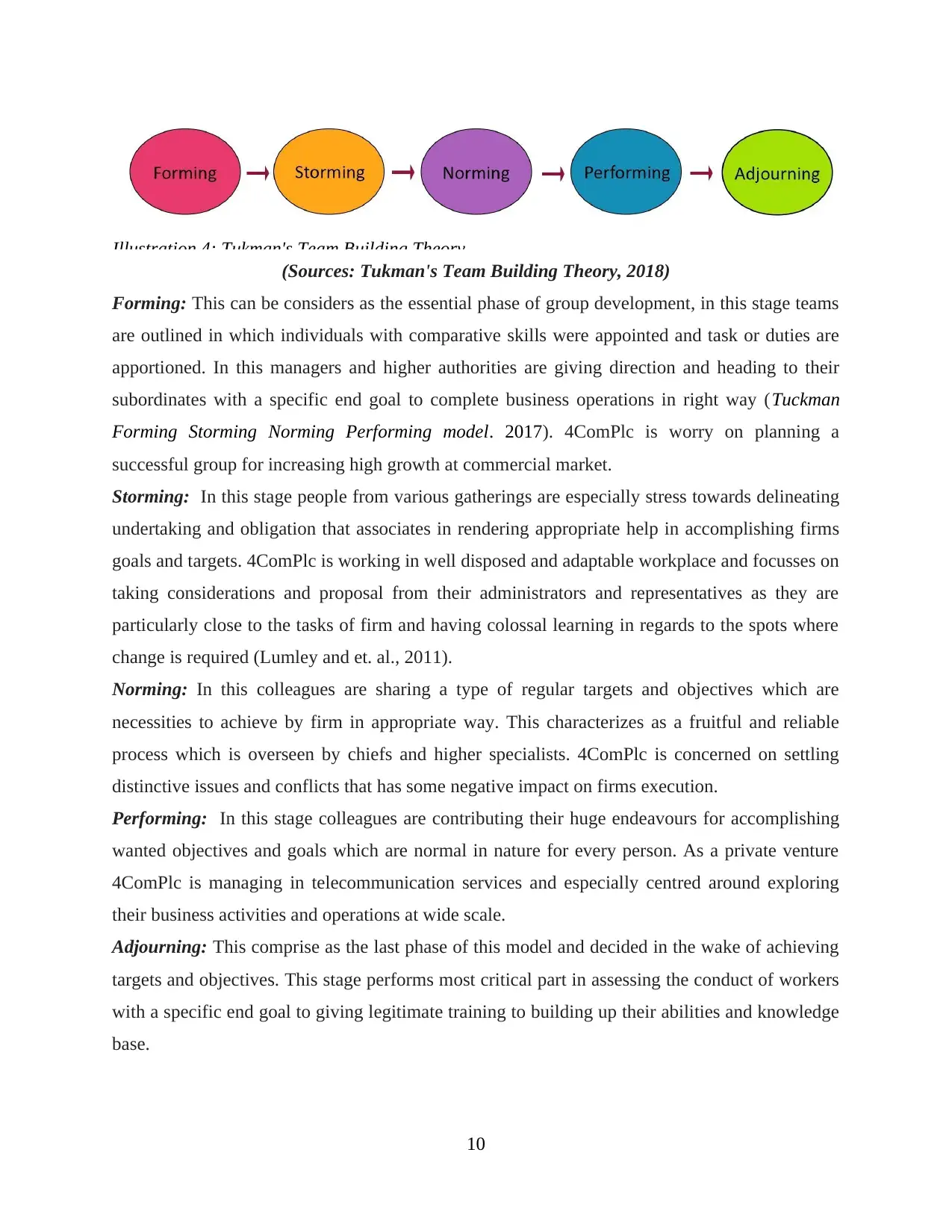
(Sources: Tukman's Team Building Theory, 2018)
Forming: This can be considers as the essential phase of group development, in this stage teams
are outlined in which individuals with comparative skills were appointed and task or duties are
apportioned. In this managers and higher authorities are giving direction and heading to their
subordinates with a specific end goal to complete business operations in right way (Tuckman
Forming Storming Norming Performing model. 2017). 4ComPlc is worry on planning a
successful group for increasing high growth at commercial market.
Storming: In this stage people from various gatherings are especially stress towards delineating
undertaking and obligation that associates in rendering appropriate help in accomplishing firms
goals and targets. 4ComPlc is working in well disposed and adaptable workplace and focusses on
taking considerations and proposal from their administrators and representatives as they are
particularly close to the tasks of firm and having colossal learning in regards to the spots where
change is required (Lumley and et. al., 2011).
Norming: In this colleagues are sharing a type of regular targets and objectives which are
necessities to achieve by firm in appropriate way. This characterizes as a fruitful and reliable
process which is overseen by chiefs and higher specialists. 4ComPlc is concerned on settling
distinctive issues and conflicts that has some negative impact on firms execution.
Performing: In this stage colleagues are contributing their huge endeavours for accomplishing
wanted objectives and goals which are normal in nature for every person. As a private venture
4ComPlc is managing in telecommunication services and especially centred around exploring
their business activities and operations at wide scale.
Adjourning: This comprise as the last phase of this model and decided in the wake of achieving
targets and objectives. This stage performs most critical part in assessing the conduct of workers
with a specific end goal to giving legitimate training to building up their abilities and knowledge
base.
10
Illustration 4: Tukman's Team Building Theory
Forming: This can be considers as the essential phase of group development, in this stage teams
are outlined in which individuals with comparative skills were appointed and task or duties are
apportioned. In this managers and higher authorities are giving direction and heading to their
subordinates with a specific end goal to complete business operations in right way (Tuckman
Forming Storming Norming Performing model. 2017). 4ComPlc is worry on planning a
successful group for increasing high growth at commercial market.
Storming: In this stage people from various gatherings are especially stress towards delineating
undertaking and obligation that associates in rendering appropriate help in accomplishing firms
goals and targets. 4ComPlc is working in well disposed and adaptable workplace and focusses on
taking considerations and proposal from their administrators and representatives as they are
particularly close to the tasks of firm and having colossal learning in regards to the spots where
change is required (Lumley and et. al., 2011).
Norming: In this colleagues are sharing a type of regular targets and objectives which are
necessities to achieve by firm in appropriate way. This characterizes as a fruitful and reliable
process which is overseen by chiefs and higher specialists. 4ComPlc is concerned on settling
distinctive issues and conflicts that has some negative impact on firms execution.
Performing: In this stage colleagues are contributing their huge endeavours for accomplishing
wanted objectives and goals which are normal in nature for every person. As a private venture
4ComPlc is managing in telecommunication services and especially centred around exploring
their business activities and operations at wide scale.
Adjourning: This comprise as the last phase of this model and decided in the wake of achieving
targets and objectives. This stage performs most critical part in assessing the conduct of workers
with a specific end goal to giving legitimate training to building up their abilities and knowledge
base.
10
Illustration 4: Tukman's Team Building Theory
⊘ This is a preview!⊘
Do you want full access?
Subscribe today to unlock all pages.

Trusted by 1+ million students worldwide
1 out of 16
Related Documents
Your All-in-One AI-Powered Toolkit for Academic Success.
+13062052269
info@desklib.com
Available 24*7 on WhatsApp / Email
![[object Object]](/_next/static/media/star-bottom.7253800d.svg)
Unlock your academic potential
Copyright © 2020–2026 A2Z Services. All Rights Reserved. Developed and managed by ZUCOL.





